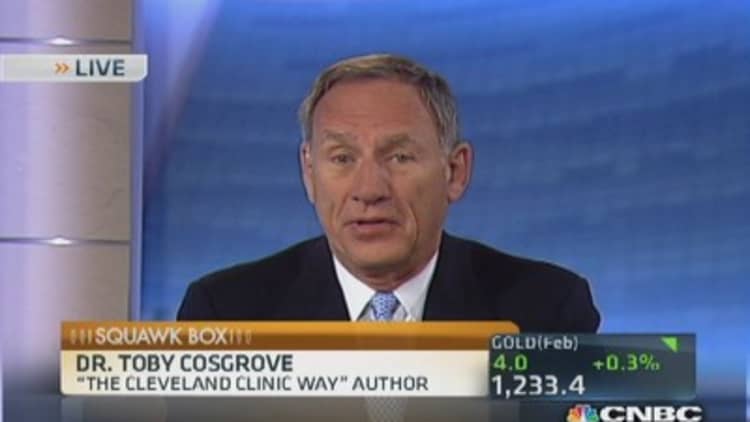
Cleveland Clinic CEO Dr. Toby Cosgrove told CNBC on Friday he's not seeing an influx of newly insured Americans whose Obamacare coverage began with the new year.
"We can't really detect a noticeable change in the number of people coming. But it's way too early to tell," Cosgrove said in a "Squawk Box" interview. "I don't think a week or two makes a season."
About 2.1 million people enrolled in Obamacare as of Jan. 1—buying private health plans on the federally operated marketplace, HealthCare.gov, or one of the state-run exchanges. Coverage began in the new year for those who had signed up by Dec. 24.
There's been some anecdotal evidence from around the nation that people with Obamacare plans are still using emergency rooms as their primary means of getting treatment.
(Read more: Obamacare: Real stories from real people)
"I wouldn't be surprised if people continue to do this," acknowledged Cosgrove, a supporter of Obamacare. "It's going to take a long time before we see the effects of this law moving people in a different direction."
House Republicans are expected to hold votes Friday on two measures aimed at requiring more disclosures about security and performance issues on the federal exchange, which got off to a rocky start after launching on Oct. 1.
The office of Senate Majority Leader Harry Reid told Politico the Nevada Democrat won't bring up these bills in the Senate. There's no word from the White House, but administration officials have said HealthCare.gov meets federal security standards, and the early functionality problems have largely been fixed.
Republicans are renewing their four-year attack on the president's health-care law heading into the midterm elections in November. They're looking to seize on the outrage over the botched website roll-out and the cancellation of millions policies that didn't meet the tougher coverage standards.
Critics have also said that uncertainty surrounding Obamacare and its requirements on businesses have put a lid on job growth. Cosgrove said he's concerned about the impact on jobs at large, but pointed out that as the law looks to reduce costs there's going to be "less money in the health-care industry and that is going to involve cutting back" on health-related jobs.
But he said, "We knew we had to change because the health care in the United States was too expensive. This was not a perfect law by any stretch of the imagination. There are going to be problems that crop up, unintended consequences."
(Read more: Obamacare slows health spending—not economy: Orszag)
Whether it's because of Obamacare or the strengthening economy, health spending as a share of GDP in 2012 fell to 17.2 percent from 17.3 percent the previous year. That's the first decrease since 1997. The federal government also announced on Monday that health-care spending in 2012 rose a modest 3.7 percent over the prior year to $2.8 trillion.
—By CNBC's Matthew J. Belvedere. Follow him on Twitter @Matt_SquawkCNBC.


